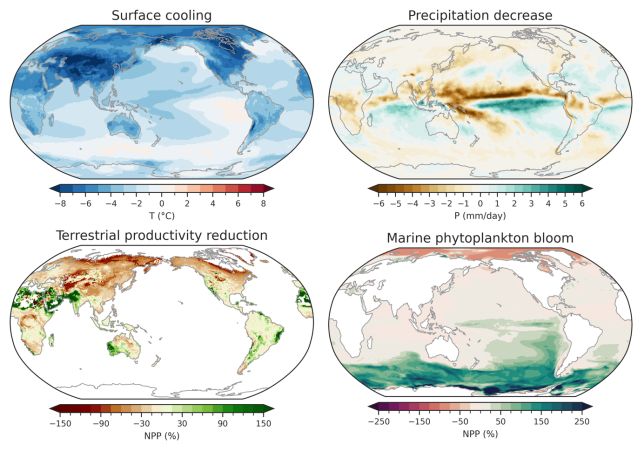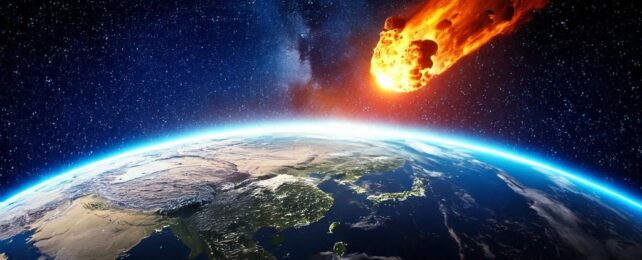Simulations of a potential impact by a hill-sized space rock event next century have revealed the rough ride humanity would be in for, hinting at what it'd take for us to survive such a catastrophe.
It's been a long, long time since Earth has been smacked by a large asteroid, but that doesn't mean we're in the clear. Space is teeming with rocks, and many of those are blithely zipping around on trajectories that could bring them into violent contact with our planet.
One of those is asteroid Bennu, the recent lucky target of an asteroid sample collection mission. In a mere 157 years – September of 2182 CE, to be precise – it has a chance of colliding with Earth.
That chance is slim, for sure, just 1 in 2,700, or 0.04 percent. But that's not zero.
In order to be prepared for the worst, climate scientists in South Korea have modeled what would happen if such a collision took place, especially given that the last major asteroid impact 66 million years ago, known as Chicxulub, is implicated in the extinction of the dinosaurs.
Bennu, at 500 meters (1,640 feet), is considerably smaller than the estimated 10 to 15 kilometer size of the Chicxulub impactor – but even so, the results are alarming.
"Our simulations, which inject up to 400 million tons of dust into the stratosphere, show marked disruptions in climate, atmospheric chemistry, and global photosynthesis," write Lan Dai and Axel Timmerman of Pusan National University in South Korea.
"Global mean temperatures are projected to drop by 4 degrees Celsius, and global precipitation decreases by 15 percent in our simulations."
The effects of a medium- to large-sized impact are not fully known; such a catastrophic event is likely to have long- and far-reaching consequences. Scientists have probed the effects of the Chicxulub impact based on geological, fossil, and tree records, which combine to paint a pretty grim picture.
To understand the effects of future impacts, Dai and Timmerman used the Aleph supercomputer at the university's IBS Center for Climate Physics to simulate a 500-meter asteroid colliding with Earth, including simulations of terrestrial and marine ecosystems that were omitted from previous simulations.
It's not the crash-boom that would devastate Earth, but what would come after. Such an impact would release 100 to 400 million metric tons of dust into the planet's atmosphere, the researchers found, disrupting the atmosphere's chemistry, dimming the Sun enough to interfere with photosynthesis, and hitting the climate like a wrecking ball.
In addition to the drop in temperature and precipitation, their results showed an ozone depletion of 32 percent. Previous studies have shown that ozone depletion can devastate Earth's plant life.
"The abrupt impact winter would provide unfavorable climate conditions for plants to grow, leading to an initial 20 to 30 percent reduction of photosynthesis in terrestrial and marine ecosystems," Dai says. "This would likely cause massive disruptions in global food security."
But it's not all doom and gloom. While terrestrial plants are sensitive to such changes and take a while to recover, algae that live in bodies of water not only bounced back more quickly, recovering within months, they grew to volumes they don't reach under current, normal climate conditions.

This unexpected behavior was linked to iron in the asteroid dust and dust from material ejected from Earth on impact, a nutrient that helped the simulated algae thrive. This was especially the case for marine diatoms, on which zooplankton feed – suggesting a possible avenue for alleviating food insecurity, the researchers say.
It's impossible to tell exactly how often our planet has been smacked by large asteroids in its history. Craters are erased and covered over by erosion processes. Some large rocks explode in the air, leaving only debris that is difficult to identify in the geological record if you're not looking for it.
Estimates, however, suggest that it's not uncommon. Which means humanity as a whole would likely survive a rendezvous with Bennu, albeit in smaller numbers than prior, and with dramatically altered lifestyles, at least for a while.
"On average, medium-sized asteroids collide with Earth about every 100 to 200 thousand years," Timmermann says. "This means that our early human ancestors may have experienced some of these planet-shifting events before with potential impacts on human evolution and even our own genetic makeup."
We're as bad as cockroaches, honestly.
The research has been published in Science Advances.
